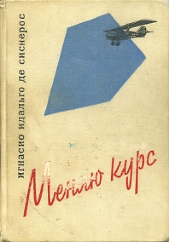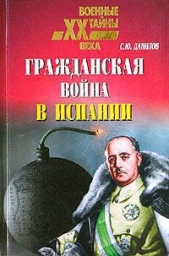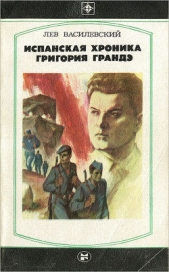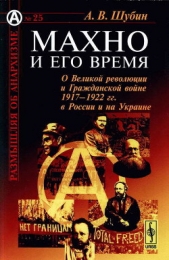Великая Испанская революция
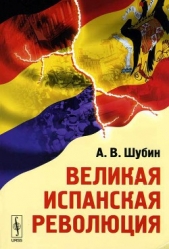
Великая Испанская революция читать книгу онлайн
В настоящей книге вниманию читателей предлагается комплексный анализ испанской революции и гражданской войны 1930-х гг. На основе обширных архивных материалов и современной испанской литературы автор реконструирует сложные обстоятельства истории Испании 30-х гг., когда эта страна оказалась в эпицентре мировой политики. Героями книги являются не только испанские политические деятели — от анархистов до фашистов, не только ведущие мировые лидеры того времени — Сталин, Чемберлен, Муссолини, Гитлер и другие, но и советские люди, которые приняли участие в революционных событиях. Многие материалы советских военных специалистов публикуются в книге впервые. Однако главным героем книги является все же испанский народ — расколотый, но переживающий звездный час своей истории, когда судьбы мира зависели от энтузиазма и действий простых людей труда.
Книга будет полезна исследователям истории 1930-х гг., преподавателям, студентам-историкам, а также всем, кому интересна история Испании, левых идей, социально-политических и международных конфликтов кануна Второй мировой войны.
Внимание! Книга может содержать контент только для совершеннолетних. Для несовершеннолетних чтение данного контента СТРОГО ЗАПРЕЩЕНО! Если в книге присутствует наличие пропаганды ЛГБТ и другого, запрещенного контента - просьба написать на почту [email protected] для удаления материала
El mismo nacimiento del sistema capitalista basada en los principios de autogestión y no de dirección estatal hizo la revolución española uno de los acontecimientos principales de la istoria munidial. Testifica que en la combinación de palabras «estado social» la segunda es de clave. Las reformas sociales engendradas por el colapso del capitalismo espontáneo podían realizarse con reforzamiento del estado: a la manera norteamericana, alemana, italiana y soviética, o con reforzamiento de las estructuras de autoregulación de la sociedad, tales como los sindicatos, órganos de la administración autónoma territorial, los movimientos sociales democráticos, en una palabra, a la manera española.
Sean potentes que sean las leyes del desarrollo histórico, mucho en la dirección de los flujos de historia depende de sus «momentos estelares», como decía Stefan Zweig. Las fuerzas sociales llegan al equilibrio y entonces todo depende del «factor sujetivo». El resultado del «momento estelar» determina el rumbo de los destinos de millones de hombres para décadas en adelante.
La «hora estelar» de España es el tiempo de la Gran Revolución Española de los 30. Este periodo de la istoria española es un pozo inagotable de las lecciones para los todos que desean transformar al mundo sobre bases de la libertad y solidaridad, los que buscan una alternativa real al autoritarismo y al capitalismo.
España se halló en el epicentro de la política mundial y de ella dependían los destinos del mundo. Tal papel exige sacrificios, pero al mismo tiempo da la vida y no la vegetación.
En la cadena de los eventos de la política mundial de los 30, cuando una casta pequeña de los hombres de estado decidía el destino de millones de hombres, los hechos ibéricos se singularizan por lo que la historia se hiciera «desde abajo» y los ciudadanos de a pie hubieran atrevido a arreglar su vida a su manera y oponerse a las órdenes de los «jefes». Por eso, a pesar de toda la sangre y inmundicia que sobraba en la historia de la revolución española, sus líderes seriamente tenían en cuenta la voluntad de la gente común. Esto sucede muy raras veces y cuesta caro.
[en]
The Great Spanish Revolution was caused by several deep social conflicts generated by antagonism of «two Spains»: conservative religious Spain and secular progressive Spain; contradictions of transition to industrialization in the agrarian society; the choice between strategies of transition to the social state during the Great Depression. Such overlapping resulted in the formation of a wide ideological spectrum, from anarchists to fascists. Under the circumstances the liberal center degraded and enjoyed less support. The rapid development of the anarchist movement, especially anarcho-syndicalism, became an important feature of the Spanish Revolution even in comparison with the Russian Revolution where the anarchism also played an important role. Social solidarity traditions of Spanish workers also facilitated the development of socialist ideas, especially anarcho-syndicalism.
Each influential political force of the Spanish tragedy was not monolithic. The right CEDA vibrated between fascism and conservatism, and the fascism tried to combine the Italian patterns, the Spanish conservative tradition and syndicalism. The liberal organizations moved either towards conservatism (radicals) or social democratic values. PSOE was torn apart by the struggle of the left socialists (caballerists) and social-liberals (prietists, etc.). The libertarian camp included a wide spectrum of parties, from anarchist extremism to moderate syndicalism close to the left social democracy. The contradictions between Marxist-Leninists were the sharpest. The Communist Party of Spain (CPS) and National-Communist (procommunist) PSUC considered the Anti-Stalin Marxist-Leninist POUM which tried to make an collaboration with CNT to be main enemy of CPS-PSUC alongside with the fascism. The important role in a political life was played by the trade unions which in fact controlled their members not only in social, but in the political aspect as well.
The situation in Spain also depended on the world developments: Great Depression, struggle between fascism and communism. In the Spanish circumstances, the People’s Front policy initiated by Comintern was of great importance. It provided the organizational form for consolidation of the left forces and facilitated the transition of CPS to the moderate positions. However, the People’s Front won the election partly due to support of anarcho-syndicalists.
The political heat developed after the People’s Front had come to power didn’t quite match up the mildness of the reforms implemented by the liberal government. The mass moods were «piled up» and radicalized by the ideological elite. The potential victory of political opponents was considered a catastrophe. The moderate policy of liberals didn’t correspond with the depth of social crisis. The profascist militaries exploited the situation to seize power and destroy the Republic. Although Franco and his generals indentified themselves with a multiple-valued term «nationalists», their ideology had fascist character.
When the militaries tried to put an end to the governance of the Left, they immediately received a counterstroke from the trade unions and socialist parties. They secured a full mobilization and achieved distribution of arms to the people. The republican army began to form as a militia army. It assured the initial success of republicans over the greater part of the country.
Both the rebellion and fighting against it were accompanied by terror. Antirepublican terror was more regular, whereas one from the republic anarchists more spontaneous.
The assistance provided by «Axis» countries helped rebels to recover from the first attack in July. It became clear that the republican militia, which surpassed the army in the city conditions, was unable to pursue an offensive war. CNT militia failed to attack Saragossa. There the front consolidated. In the other regions where the militia system was not supported by the strong syndicalism structure in the rear, the militia could not maintain any sufficient resistance to the direct attack of the army.
The European diplomacy was caught off guard by the internationalization of the conflict in Spain. At first, it seemed like the situation would be quickly resolved either by a victory or defeat of revolution. Instead of which a prolonged war began; moreover, in many respects it began due to external intervention. Intense diplomatic activity around the Spanish tragedy made some authors to believe that the destiny of Spain was not solved in Madrid. That corresponded to the opinion of the rulers of destinies of the World in London, Paris, Berlin and Rome. But the Spaniards fighting spoilt a game to the European diplomacy. If the republicans had not defended Madrid, not continued struggling up to 1939, «the Spanish item» would have been quickly removed from the agenda. The destiny of Spain was shaped not only in Madrid, but in Madrid as well. Contrary to the opinion of some politicians of the Republic (including President Azaña) and some modern historians, the war had not been initially lost by republicans, all the more so as they had received the timely aid from the USSR which alongside with inter-brigades counterbalanced the factor of fascist intervention up to 1938.
Showing resistance to the fascism, Spain changed a situation in the Europe. It built up strained relations between the conservative government of the Great Britain and People’s Front of France which was «ideologically aligned» with the Republic. However, the leaders of French People’s Front in fact betrayed the Spanish Republic being afraid of both the revolution and fascism. The war in Spain enabled rapprochement between Germany and Italy, and in order to return Italy to «Antanta» the Great Britain and France were ready to sacrifice the Spanish Republic. The policy of appeasement which reached a «Munich moment» had first been «approbated» in Spain in the form of hands off approach. The USSR participated in it for tactical reasons. After having checked that the fascists didn’t stop helping the rebellion, the Soviet management also began to assist the Republic. It was of the essential importance for the USSR both for ideological and foreign policy reasons that the Republic didn’t crash. The war in Spain was not only the first large-scale fight against fascism. It distracted attention of the West including Nazism from the borders of the USSR in an opposite direction.
